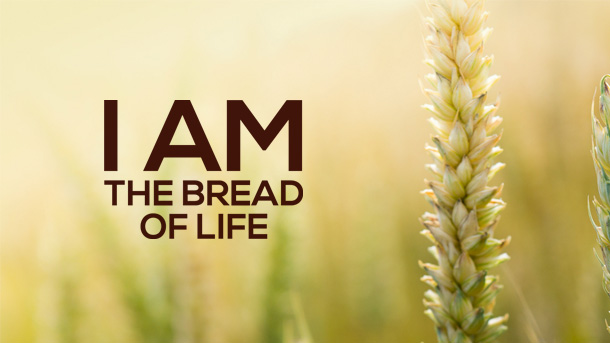Jesus’ discourse can seemingly be split up into two audiences:
the general crowd that followed him (6:26-40), and some select religious Jews who were either a segment of the crowd or joined later (6:41-58), in other words, casual hearers and the more dedicated religious crowd. Neither received the life-giving bread. The first group was too full of self-sufficiency (they didn’t recognize their need for a spiritual savior), the latter group was too full of self-righteousness or religion. Neither had room for Jesus. To truly believe in Christ and come to him, one must recognize his own spiritual poverty and hunger and thirst after Godly righteousness.
This message will focus primarily on the first portion of the discourse. Jesus expresses some deep truths on belief. Four points we will examine are:
OUTLINE
- The carnal man cannot receive the spiritual bread.
- One can be too filled with religion to receive the spiritual bread.
- For those who have received the spiritual bread, it is because God has drawn them and gifted them to Jesus.
- For those who have received the spiritual bread, consuming anything else is unnatural to their new nature.
John’s gospel is far more concerned with the words of Jesus (particularly as it relates to his deity) than with miracles and even parables. John focuses on Jesus’ words as “spirit and life” (John 6:63), and as we will see in Jesus’s discourse, Jesus puts far more weight on belief in who he is and what he says versus the miracles he does. The crowd in John 6 does just the opposite.
Jesus has recently healed a lame man (John 5:8, John 6:2). As he departs to be alone for a period of time (Matt 14:13), the crowd that saw the miracle follows him. Jesus has compassion on them, healing their sick (Matt 14:14) and teaching them many things (Mark 6:34). It is after spending a day ministering to them that he performs the miracle of multiplying the fishes and loaves. When he sees that they are going to take him by force to make him king, he departs to a mountain by himself, then walks away from them on the water by night to meet his disciples (the things one will do for a little privacy). It is the next day while Jesus begins to teach in the synagogue in Capernaum (6:59), that the crowd finally tracks down their king and Jesus begins his sermon.
The carnal man cannot receive the spiritual bread
Vs 26
Two primary interpretations: 1) The people whom Jesus was now speaking to were far enough away that they ate the loaves and fishes but did not witness the miracle. 2) They saw the miracle, but did not perceive the signs of the Messiah and were yet motivated by carnal purposes. The latter is the more likely option, as in the previous narrative John notes that their intentions were to make him king by force (6:15). People don’t do that unless talk has spread of something great. In fact, the crowd that Jesus fed had initially followed him to the place of feeding because they had seen the miracles that he had done on the diseased (John 6:2).
If Jesus’ goal was to have a large church he was on track. Yet the blunt message of the following sermon shows that Jesus knows those who are really his, and that he’d rather present a potentially offensive and divisive truth than suffer belief in a fallacy.
This is the same Son who is to die for the sins of the world out of love (John 3:16). We should keep this in mind throughout Jesus’ discourse. Jesus speaks out of love. He doesn’t mince words. He is not after an emotional decision. He doesn’t dim the lights and have the organ give him a smooth soundtrack to help people with a “yes”. God desires a “yes” (1 Tim 2:4), but Jesus (and hopefully us today) understands that presenting anything less than the truth is a disservice to the hearer in the long run.
Vs 27
Life sustained. The food Jesus gives endures to eternal life. Jesus gives life “abundantly” (John 10:10). Those who eat of Jesus “abide” (remain, stay) in him. It is a continuous relation of loving sustenance. Once any life is born/created, its natural next step is to be nurtured and developed. This growing and fruitful life is what God intends for us; God’s Spirit in us is meant for it (1 Cor 6:19). We must make provision for it. This will be developed over the course of Jesus’ sermon.
Christ has God’s unique seal, the “only begotten”, the only chosen and qualified mediator of the new covenant (Luke 4:18). God has given the Son alone for salvation (John 1:4), approving him (Luke 9:32) and confirming him (Heb 2:3-4). John shows us the fourfold witness of Jesus’ divinity earlier (John 5:31-40) 1) John the Baptist 2) The works he does 3) The Father 4) The scripture. The Word that came from heaven (John 1:14) is substance of God himself, and is sealed with all of God’s promise and authority—He cannot fail.
Vs 28-29
The crowd asked what “work” they must do, probably referring to the law—their later over-elevation of Moses would imply this. For this particular question, the correct answer is that they must first believe[1] that Jesus is not only greater than Moses, but Moses wrote concerning him (Jesus, no other) as a future deliverer (John 5:46). Belief is often difficult because it sometimes involves the giving up of the comforts and familiarity of a prior belief. The gospel of Jesus Christ calls for us to fully put our trust on him, forsaking all else—whether faulty religious beliefs or belief in one’s ability to take care of herself. This is why there is a distinction between hoping in a bread ticket to heaven and casting all your cares in the bread-giver. Believing that Jesus is the Son of God is the thesis of John’s gospel (20:31), and the sign of the work of the Holy Spirit in someone’s life. Belief is no small thing, as it is a work of God and a gift from God.
[Jhn 20:31 KJV] [31] But these are written, that ye might believe that Jesus is the Christ, the Son of God; and that believing ye might have life through his name.
Vs 30-31
The sign of the multiplication attracted the people, but in their eyes it was not enough to compare to the “bread from heaven” which was given by Moses.
“Their citing of the Scripture that speaks of God giving Israel “bread from heaven” (Exod 16:15, modified by Neh 9:15 and Ps 78:24) presupposes the current teaching that the Messiah, the “second Redeemer” (after Moses, the first Redeemer), will at his coming restore the manna to Israel (so MidrQoh 1:9, ‘As the first Redeemer brought down the manna … so will also the last Redeemer cause the manna to come down’).[2]
Hence, if Jesus is God’s Messiah, can he not perform that sign? A misunderstanding (or a faulty application) of scripture can lead to corrupt theological assumptions. Even when Jesus clarifies that he is the new manna, the state of their hearts will not let them accept the truth. They’ve already made up their minds what the kingdom of God should be like. What a sobering lesson in true belief! Even a strong knowledge of various scripture and being engaged in religious activity do not guarantee a heart sensitive to salvation.
Vs. 32-34
Lord, give us this bread!
Now is the moment we see who is truly able to partake in the new bread of the kingdom. Jesus will give them the bread, and the carnal will be divided from the spiritual.
It is the natural state of man to believe in something. From the moment we are born we are inclined to believe based on our experiences and what we hear from those we’ve learned to trust (also though carnal experience). Post-fall, we are made from the dirt, the dirt sustains us, and we return to the dirt.
[Gen 3:19 KJV] [19] In the sweat of thy face shalt thou eat bread, till thou return unto the ground; for out of it wast thou taken: for dust thou [art], and unto dust shalt thou return.
This is why the adoption (Eph: 1:5) is not only a return back to our Father, but a spiritual rebirth (John 5:3). It is unnatural that a carnal creature that is conditioned to carnal things would change into a creature with spiritual desires. This is a work of God.
One can have faith in the (1) blessing/miracle more than the blessing giver. One can have faith in the (2) creation more than the creator. One can have faith in the (3) messenger more than the God behind the message. This was the case with these people and Moses. Moses was greatly used of God, yes he is no less a transgressor of the law than you or me. Each of the three traps just mentioned can be fallen into due to a lack of true faith in the invisible God:
(1) Blessings = lust of the eyes,
(2) Creation = lust of the flesh,
(3) People = pride of life.
Again, belief is not some elementary quality of believers that’s forgotten when we move on to grand things like obedience and repentance. A true belief in the full gospel should most certainly yield obedience and repentance. When obedience and repentance are lacking in a believer’s life, it is often not a sign of a misunderstanding of the two; the lack of obedience and repentance are indicators of a belief problem. Can someone who truly recognizes and believes in their corrupt state (Eph 2:1), sinful nature (Rom 8:28), and the fact that even in that state the love of a almighty God sent his only son from heaven to die in there place really do anything but obey and repent? Therefore the “work” for many of us is to believe that the source of all sustenance is the Lord Jesus Christ. As mentioned earlier, a belief that Jesus is the eternal sustenance (bread) means that everything else is vanity and perishing. This is why it’s repeated in each gospel that one must lose or hate their life in order to find life (John 12:25, Mark 8:35, Matt 16:25, Luke 9:24).
It is a quite a work of God to take a heart of stone and replace it with a heart of flesh. Let us make our calling and election sure by verifying our belief is in, from and through Jesus Christ our God from heaven—not in the idea of Jesus Christ, the good feelings of church, religious status, a pass to heaven, or good Christian values, but belief that Jesus is the way, the truth and the life.
Vs. 34-40
Vs 35: I AM the bread of Life is the first of 1st of 7 “I am” ??? ???? statements used by Jesus to describe the gospel. This phrase is used in Exodus in the LXX (Greek translation of the OT) when God refers to himself as “I am who I am” (Ex 3:14). John uses this often in his gospel. While every instance of its use in John doesn’t necessarily have to imply a reference to God, it’s clear that John used this expression often (most notably when Jesus said “before Abraham was, ‘I am ??? ????’) to reaffirm his thesis, that Jesus is the divine Son of God.
- And Jesus said unto them, I am the bread of life: he that cometh to me shall never hunger; and he that believeth on me shall never thirst. (John 6:35).
- Then spake Jesus again unto them, saying, I am the light of the world: he that followeth me shall not walk in darkness, but shall have the light of life. (John 8:12).
- I am the door: by me if any man enter in, he shall be saved, and shall go in and out, and find pasture. (John 10:9).
- I am the good shepherd: the good shepherd giveth his life for the sheep. (John 10:11).
- Jesus said unto her, I am the resurrection, and the life: he that believeth in me, though he were dead, yet shall he live: (John 11:25).
- Jesus saith unto him, I am the way, the truth, and the life: no man cometh unto the Father, but by me. (John 14:6).
- I am the true vine, and my Father is the husbandman. (John 15:1).
“’Bread of Life’ means bread which provides life. Jesus is man’s necessary ‘food.’ In Western culture, bread is often optional, but it was an essential staple then.”[3]
Belief in that bread must take place. Then one must partake of that bread (eat and drink of Jesus vs 53). Sadly, the end of Jesus’ discourse to the crowd shows that they were still carnal, and could not receive the heavenly bread because God had not given them to Jesus.
One can be too filled with religion to receive the spiritual bread.
One cannot help but remember the parallel story John included in his gospel just chapters earlier involving the woman at the well. Those who drink Jesus’ water will live forever. Note the contrast in the responses. The marginalized, half-breed, adulterous Samaritan believed in and honored the Son of God; the religious Jews (now entering the narrative at verse 41, probably a smaller group then the general crowd) took offense to his sayings, because in all their religious works they were still carnal. One was empty and aware of her sin, the others were full and unaware of their sin.
We can be eating religion until we are stuffed, yet spiritually be starving. I doubt the enemy has a problem with people attending church or bible studies 7 days a week, as long as they don’t change or do anything fruitful with the message.
The close of the sermon on the mount (Matt 7) references a group that seemed very busy with the works of God. They even did mighty works in the name of Jesus. Jesus told them that on judgment day they would be told to depart because Jesus “never knew” them. The “Many will say unto me Lord Lord…” passage is often cherry-picked to be included in various topical Bible studies, but it must be taken in context.
“Jewish teachers frequently spoke of the Law as “bread”; there are indications that some at least also identified the manna with the Torah (so Philo in Mut 253–63; and especially Mek Exod 13:17”[4]
Jesus is concluding his sermon regarding the Kingdom of Heaven. He starts with the qualifications of those able to receive the kingdom: poor in spirit, mourning over their sinful state, hungry for righteousness, etc. He then goes on to elevate the law back to its rightful place of righteousness, exposing how the religious traditions have taken away from the true power and motivation of righteousness. Jesus doesn’t do away with the law, but upholds it, and in Jesus Christ the law is fulfilled. Therefore to fulfill the law and to have our righteousness “exceed that of the scribe and Pharisees”, indeed to be declared righteous at all, we must be in Christ. God must see his Son when he sees us. To get to the point of belief one will demonstrate the initial beatitudes, for only those who recognize their need for a savior will accept one. Jesus’ warning (Many will say to me Lord Lord…) is to those who’s lives and speech were filled to the tip with impressive works (many even in Jesus’ name), but they had not truly come to Jesus and ate of him, abandoning all. They had preferred the signs, miracles, and the physical bread—the idea of Jesus, hence they never came to him, and he “never knew them”.
Those who will hear and not believe are either full of self-righteousness (Matt 5:6) or self-sufficiency (Matt 5:3). They are either justified in their minds by their own religious works, or they have the illusion that they are whole and complete outside of Christ. To the former Jesus is a stumbling block, a fool to the latter (1 Cor 1:23).
For those who have received the spiritual bread, it is because God has drawn them and gifted them to Jesus.
Vs 37/44-45.
You are a gift to Jesus from God. You have been given to him. Those who have been taught of God (John 6:45) will come to Jesus and believe in Jesus. There is no knowing God outside of Jesus. Those who experience the true knowledge of God have been chosen and called by God (Rom 8:28-30). Thanks be to God for this unspeakable gift.
[Eph 1:4-5 KJV] [4] According as he hath chosen us in him before the foundation of the world, that we should be holy and without blame before him in love: [5] Having predestinated us unto the adoption of children by Jesus Christ to himself, according to the good pleasure of his will,
It is reassuring, humbling, and gratifying to understand that those who believe on Christ and come to Christ were part of a larger plan from even before they were born. And this was done “according to the good pleasure of his will”. Dwelling on this simple point can cause too many emotions to name (awe, excitement, joy, motivation, etc.), and it should cause one to be devoted to God and his commandments.
For those who have received the spiritual bread, consuming anything else is unnatural to their new nature.
Vs 44. God has drawn us who believe to Himself. To spiritually eat of Jesus is now our natural diet. When we eat of the things of the world we are resisting the Spirit, we are grieving God, and we are doing something that is unnatural to truly born-again saints. In the same way our natural man would reject eating a rock but accept a loaf of bread, the spiritual man should reject any sustenance not of Christ.
[Jhn 5:24 KJV] [24] Verily, verily, I say unto you, He that heareth my word, and believeth on him that sent me, hath everlasting life, and shall not come into condemnation; but is passed from death unto life.
We have passed from death to life. We have eternal life now (2 Cor 5:17).
Sometimes a little knowledge can completely change someone’s life. Even as believers, the enemy will try to have us think that we are still carnal, and that we must work to be spiritual. The truth is, we are spiritual, and anything contrary to consuming Jesus should be a foreign substance to us. When we choose carnality over Jesus, it’s us resisting the Holy Spirit; it’s us resisting our natural state as children of God.
Armed with this simple knowledge we can now recognize that despite what we may have formally believed about ourselves, our natural craving is for the things of God. Our natural state of thought is one towards God. Our natural affections are towards God. Choose this day to serve the spiritual man. Realize and believe that Jesus is your natural substance. Remember that it was God who for-ordained this, who drew you himself. Do not believe that slavery in Egypt is somehow better than the freedom of eating the manna from heaven.
We need to know and rehearse often that we are new creatures (2 Cor 5:17), sanctified, justified (1 Cor 6:11), citizens of heaven (Phil 3:20), and seated with Christ in heavenly places (Eph. 2:6). And he daily and supernaturally provides us with sustenance.
[1] Note that this answer may vary depending on where one is in their relationship with God. When asked a similar question in Acts 2, Peter mentions repentance and baptism. It’s evidence that the group who had heard the message had just believed on Jesus because they were “pricked in/cut to” the heart (Acts 2:37). They were now to change their thinking and become disciples.
[2] George R. Beasley-Murray, John, vol. 36, Word Biblical Commentary (Dallas: Word, Incorporated, 2002), 91.
[3] Edwin A. Blum, “John,” in The Bible Knowledge Commentary: An Exposition of the Scriptures, ed. J. F. Walvoord and R. B. Zuck, vol. 2 (Wheaton, IL: Victor Books, 1985), 296.
[4] George R. Beasley-Murray, John, vol. 36, Word Biblical Commentary (Dallas: Word, Incorporated, 2002), 92.



